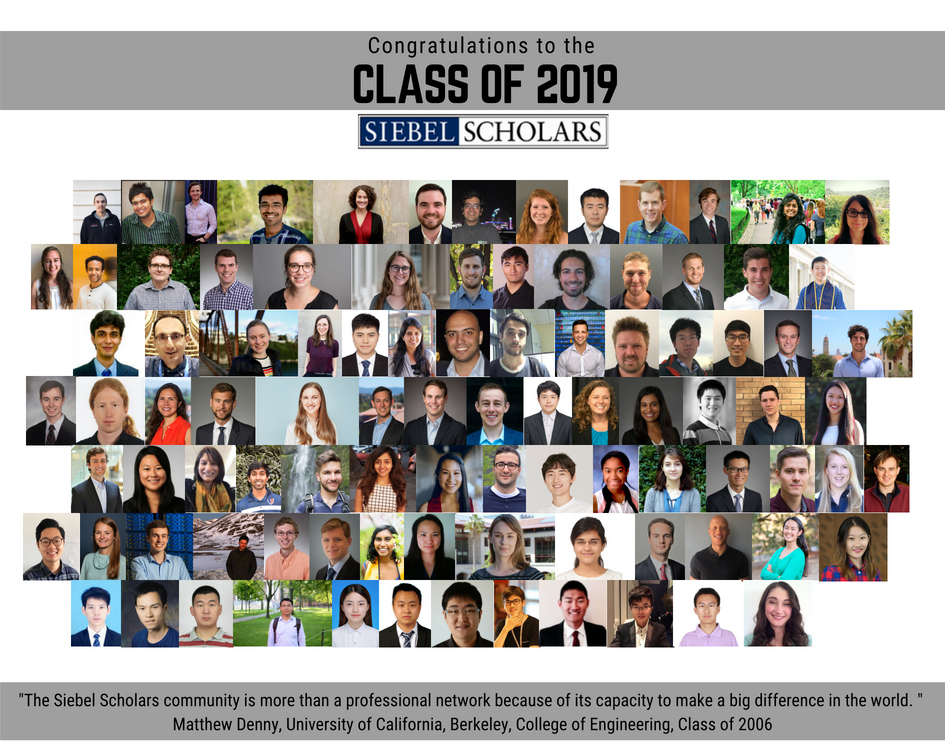Welcome Class of 2019 Siebel Scholars


The Internet of Things. AI. Machine Learning. Cloud Computing. Big Data. With profound shifts taking place in technology, the world requires thinkers who change the rules about how it can be applied for human benefit across societal domains.
Today, 96 distinguished students of the Class of 2019 join past Siebel Scholars classes to form an unmatched professional and personal network of more than 1,300 entrepreneurs, researchers and philanthropists. 96 students hailing from the world’s top programs in business, computer science, bioengineering, and energy science. This exceptional group of leaders directly influence the technologies, policies, and economic and social decisions that will shape the future.
“Every year, the Siebel Scholars continue to astound me with their commitment to academics, research and influencing our collective future. This year’s class is exceptional, and once again represents the best and brightest from around the world,” said Thomas M. Siebel, Chairman of the Siebel Scholars Foundation. “It is my great pleasure to welcome these men and women into this ever-growing, lifelong community, and I personally look forward to seeing their impact and contributions unfold.”
Established in 2000 by the Thomas and Stacey Siebel Foundation, the Siebel Scholars program awards grants to 16 universities in the United States, China, France, Italy and Japan. Following a competitive review process by the deans of their respective schools on the basis of outstanding academic achievement and demonstrated leadership, the top graduate students from 27 partner programs are selected each year as Siebel Scholars and receive a $35,000 award for their final year of studies. On average, Siebel Scholars rank in the top five percent of their class, many within the top one percent.
This year’s honorees are:
Graduate Schools of Computer Science
Carnegie Mellon University, School of Computer Science:
Alankar Jain, Kijung Shin, Tanya Marwah, Xaioyue Cui, Zhilin Yang
Harvard John A. Paulson School of Engineering and Applied Sciences:
Emma Alexander, Nam Wook Kim, Robert Thomas Bowden, Bradley McDaniel, Jaroslaw Blasiok
Massachusetts Institute of Technology, School of Engineering:
Andrew Mullen, Logan Engstrom, Nichole Clarke, James Mawdsley, Alireza Fallah
Princeton University, School of Engineering and Applied Science:
Cyril Zhang, Yinda Zhang, Mina Tahmasbi Arashloo, Ross Teixeira, Brian Bullins
Stanford University, School of Engineering:
Zoe Bohn, Paul Crews, Michelle Lam, David Tagliamonti, Lucy Wang
Tsinghua University, School of Information Science and Technology:
Yupei Wu, Yihui Ma, Fan Zhang, Xiuxing Li, Yanzhuo Ding
University of California, Berkeley, College of Engineering:
David Wang, Samantha Wathugala
University of Illinois at Urbana-Champaign, College of Engineering:
Medhini Gulganjalli Narasimhan, Ricardo Paccagnella, Anusri Pampari, Zexuan Zhong, Abhinav Kohar
University of Chicago, School of Computer Science:
Adam Holmes, Alena Stern, Emma Nechamkin, Haopeng Liu, Zihan Tan
Graduate Schools of Energy Science
Carnegie Mellon University, School of Computer Science:
Kelly Good
École Polytechnique, Graduate School:
Chloé Dindault
Massachusetts Institute of Technology, School of Engineering:
Ian Schneider
Politecnico di Torino, Doctoral School:
Andrea Bersano
Stanford University, School of Earth, Energy & Environmental Sciences:
Usua Amanam
Tsinghua University, Department of Electrical Engineering:
Yi Wang
University of California, Berkeley, College of Engineering:
Wojciech Osowiecki
University of Illinois at Urbana-Champaign, College of Engineering:
Hanchen Xu
The University of Tokyo, School of Engineering:
An He
 Share
Share


